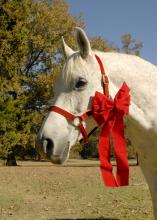Information Possibly Outdated
The information presented on this page was originally released on November 8, 2012. It may not be outdated, but please search our site for more current information. If you plan to quote or reference this information in a publication, please check with the Extension specialist or author before proceeding.
Christmas horses, ponies take commitment, money
MISSISSIPPI STATE – Many children dream of finding a sweet pony or their first horse on Christmas morning, but parents need to be aware of the ownership commitment and cost before granting that wish.
“Most first-time owners do not know how to take care of a horse or what will be required in the years to come,” said Dr. David Christiansen, assistant clinical professor with Mississippi State University’s College of Veterinary Medicine. “Many people don’t realize that horses can live 30 years or more, so the purchase could become a very long-term investment.”
Christiansen said the least expensive aspect of owning a horse is the initial purchase of the animal. Ownership expenses include feed, hoof care, veterinary needs, and pasture or stabling. If equine competitions are a consideration, they add another layer of expenses.
“Parents may think horses will teach their children responsibility, but they need to look further down the road. What will happen to the horse when the child grows up or goes to college? With the overpopulation of horses, they are harder to sell, especially as they get older,” he said.
New owners should give careful consideration to the horse’s future home. If kept mostly in an open pasture, each horse needs 2 to 3 acres for adequate grazing. Prepare safe fencing and housing before getting the horse and have it inspected by someone experienced at identifying potential hazards or problems.
Christiansen occasionally consults on potential cases of equine neglect.
“We often find situations where the owner just didn’t know how to care for the animal. Sometimes, it’s a case of people getting in over their heads in terms of work or money involved in horse ownership,” he said.
Dean Jousan, 4-H livestock specialist, said initial costs include grooming supplies, bridles, saddles and other tack. Just like the horse, the equipment costs can vary greatly. Before purchasing a horse or pony, learn as much as possible and have a respected person with horse experience evaluate the horse for the desired purpose.
Jousan said boys and girls have learned how to care for animals in 4-H since the youth development program started in Mississippi in 1907. In addition to showing horses, 4-H also offers hippology, the horse quiz bowl, horse judging, public speaking, and individual and team demonstration contests. While 4-H involvement and educational materials are free, the same cannot be said for most riding lessons.
“Lessons can run from $15 to $50 or more for a 30- to 60-minute session depending on locations, if the setting is one-on-one versus group instruction and the type of instruction involved,” Jousan said. “Instruction should be gained through weekly or twice-weekly programs for maximum benefit to the rider and the horse.”
Monroe County Extension Director B.J. McClenton is an experienced rider and trainer. He said for youth, 4-H is the logical source for information and hands-on experience about horse or pony ownership. In addition to the curriculum available, students also learn from volunteer leaders and experienced horse people.
McClenton said one of the most common mistakes parents make when selecting a horse for their child is to purchase a young or improperly trained animal, thinking they will grow and learn together. A more expensive horse that is already trained, experienced and best suited for the rider is well worth the investment.
“New riders should start with a well-trained, mature horse that can be a great babysitter. Young horses take patience, just like children, so it really takes twice as much patience to have a positive outcome,” he said. “A well-laid foundation can make the difference. Carefully select the right breed and type of horse. Choose a horse that is suited for the style of riding they want to pursue. There is usually a significant difference in horses for speed events and those for slower, pleasure events.”
McClenton said with the proper foundation, some youths may take their experience to the next level either in competition or a future career.





